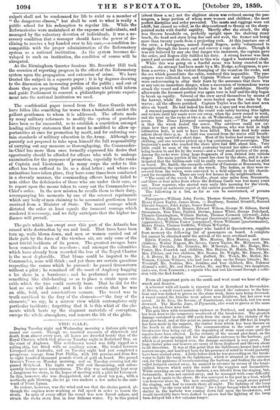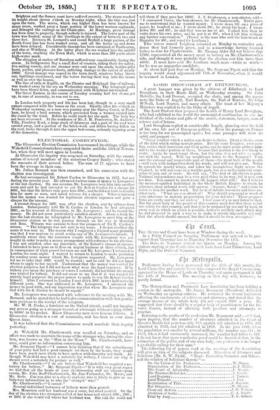THE GALE.
During Tuesday night and Wednesday morning a furious gale raged round our coasts. Though we received accounts of shipwreck and death from almost every port, all losses are dwarfed beside that of the Royal Charter, which took place on Tuesday night in Redwharf Bay, on the coast of Anglesea. This well-known vessel was fully rigged as a sailing ship, but fitted with an auxiliary screw. She traded between Liverpool and Australia, and on Tuesday night had just completed a prosperous voyage from Port Phillip, with 498 persons and from five to eight hundred thousand pounds worth of gold on board. She passed Queen's Town on Monday morning, and on Tuesday evening last she passed Holyhead. The night was wild and threatening, and subse- quently became most tempestuous. The ship was unhappily kept near a dangerous lee shore, in the hopes of meeting with a pilot for Liverpool. In this, however, she was disappointed, and at about ten p.m., with a northerly gale blowing, she let go two anchors a few miles to the east- ward of Point Lynes.
So violent, however, was the wind and sea that the chains parted, al- though the engines were working at full speed in order to lessen the strain. In spite of every effort the vessel was now forced ashore, and struck the rocks stern first in four fathoms water. Up to this period (about three a. m.) not the slightest alarm was evinced among the pas- sengers, a large portion of whom were women and children ; the most perfect discipline and order prevailed. The masts and riggings were cut adrift, but caused no relief, as the ship continued to thump on the sharp- pointed rocks with fearful rapidity. Shortly after she struck, the ship was thrown broadside on, perfectly upright upon the shelving stony beach, the head and stern lying due east and west, the former not being more than twenty yards from a projecting rock. At this juncture one of the crew, a Portuguese, named Joseph Rogers, nobly volunteered to struggle through the heavy surf and convey a rope on shore. Though it was not believed by any one that danger was imminent, the captain gave the order, and Rogers ably fulfilled his duty. A strong hawser was then passed and secured on shore, and to this was rigged a boatswain's chair.
While this was going on a fearful scene was being enacted in the saloon. An attempt had been made by a Mr. Hodge, a clergyman, to per- form a service ; but the violent thumping of the vessel on the rocks, and the sea which poured into the cabin, rendered this impossible. The pas- sengers were collected here, and Captain Withers and Captain Taylor were endeavouring to allay their fears by the assurance that there was at any rate no immediate danger, when a succession of tremendous waves struck the vessel and absolutely broke her in half amidships. Shortly afterwards the foremost portion was again torn in half and the ship began to break up rapidly. Several of the crew saved themselves by means of the hawser, while the remainder were hurled upon the rocks by the waves ; allthe officers perished. Captain Taylor was the last man seen alive on board. He had lashed his body to a spar and was drowned. A rescued passenger states that the vessel rode safely burning blue lights and rockets until her masts were cut away, when the screw ceased to work, and she went on the rocks at two a. m. on Wednesday, and broke up about seven. The Times Liverpool correspondent says :—" The probability is that the wreck fouled the screw. The survivors could not ex- plain how they got ashore. The mate, Stephens, who was held in high estimation here, is said to have been killed. The first dead body came ashore about three p. m. A child was rescued from the waves still breath- ing, but only survived a short time. Most of the bodies had money in their clothing, and one wrecker picked up a bag containing 100 sovereigns. The boatswain's mate who reached the shore alive had 4001. about him. Very little could be seen of the wreck yesterday beyond her sides—which are being beaten to and fro by the waves—and a very small portion of the poop. Among the rocks were lying huge fragments of iron, twisted into various shapes. The main portion of the vessel lies close by the shore, and it is an- ticipated that the bullion-safe will be easily recoverable. She had no pilot on board. Mr. Smith, the energetic collector of Customs at Beaumaris, was superintending the operations at the wreck. The bodies, as they were re- covered from the waves, were conveyed to a field adjacent to the church- yard for recognition. There are very few houses in the neighbourhood. " The scene of the wreck is Moelfre, about nine miles from Beaumaris, and three or four miles from where the Rothsay Castle was lost many years ago. Your reporter, who started very early this morning for the wreck, will forward an authentic report at the earliest possible moment."
The following is a list, as far as can be ascertained, of persons saved :- Passengers—William John Ferris, Thomas Grundy, James M'Capper, Henry Carew Taylor, James Dean, — Bradbury, Samuel Grenfell, Samuel Edward Gapper, John Judge, James Russell.
Seamen—William B. Draper, Edward Wilson, George M. Gibson, David Strongman, Tom Time, Patrick Devine, James White, George Pritchard, Thomas Cunningham, William Barton, Thomas Cormack (steward), John O'Brien, Joseph Rogers, George Swager (boatswain's mate), Walter Hughes (apprentice), William Foster (carpenter), Owen Williams (quartermaster), Henry Evans, Thomas Griffiths, William M'Carthy. Mr. W. A. Gardner a passenger who landed at Queenstown, supplies from memory the following list of passengers on board. A complete list cannot be obtained until the arrival of the next overland mail.
Edwin Fowler, John Murray, Mrs. Murray, Miss Murray, and three children ; Walter Nugent, Mr. Grove, Carew Taylor, Mr. blolyneux, Mr. Moss, Mr. Twedale, Mr. Grundry, Mr. M‘George Rev. Mr. Hodge, Mrs. Foster, Mrs. Fenwick and children, Mrs. Hatton, D. Hatch, Mr. Filcher. Mrs. Filcher, and two children, Mrs. Beams, Dr. Wright, Mr. Emery, Mr. J. S. Henry, M. La Forgue, Mr. Rufford, Mr. Welch, Mr. Mellor, Mr. Watson, Captain Withers who had lost a ship on the Feejee Islands; Mr.
Woodruf, ' f, Mr. Jenkins, Mrs. Jenkins, and four children, Mrs. Nahmur (Consul's wife), Mr. and Miss Fowler, Mr. and Mrs. Davies, two daughters, son, and a son from Tasmania ; a captain who had lost his vessel a colli- sion with the Red Jacket.
From all important ports on the south and west coast we hear of ship- wreck and disaster.
A schooner with all hands is reported lost at Berryhead in Devonshire. At Dover, a small vessel named the Pilot missed the entrance to the har- bour and was dashed to pieces on the stone work, three men being drowned. A vessel named the Ariadne went ashore near Brighton, but her crew was saved. At St. Ives, the Severn, of Sunderland, was wrecked, and ten men drowned. The Martha Jane, of Plymouth, also went to pieces at the same place, but no lives were lost. The gale blew with tremendous violence at Portland, and much damage has been done to the temporary woodwork of the breakwater. The greatest damage sustained is about 600 yards from the shore in the vicinity of the first pier-head, and at this point an immense gap of about 200 feet in length has been made in the support, the timber from which has been thrown on the beach in all directions. The communication to the outer or great breakwater thus being cut off, the depositing of stone must cease until the repairs have been effected. In the vicinity of the second pier-head, on the other side of the opening left for the smaller entrance to the harbour, and which is at present bridged over, the damage sustained is very great. The huge timber piles and bearers are many of them displaced and thrown about in all directions. It was at this point that the lighthouse-keeper had a very narrow escape, and had it not been for his presence of mind be would probably have been washed away. A little before dark he was proceeding on the break- water to light the lamp in the lighthouse, which is situated at the extreme end, for the guidance of vessels entering the harbour, and finding the six-feet railed footpath carried away, he essayed to advance by means of the longi- tudinal bearers which carry the roads for the waggons and locomotives. While crawling on one of these timbers, a sea lifted it from the staging, but, fortunately, it was not carried away, and he managed with some difficulty to get back again to the shore. He was conveyed to his post in a boat, which was however stove in. The men scrambling over the rough stones gained the staging, and had to remain there all night. The lighting of the lamp was truly in the very nick of time," for a large barque which was seeking shelter in the harbour was coming down full upon the breakwater, and would inevitably have been dashed to pieces had the lighting of the lamp been delayed but a few minutes longer.
Brighton and the Sussex coast have suffered severely. The storm reached its height about eleven o'clock on Monday night, when the tide was just upon the turn. The waves, which ran higher than has been known for many years, washed away a large portion of the lower western esplanade, and damaged the railings on the Chain-pier. At Hastings, great damage has been done to property, though nobody is injured. The lower part of the town was flooded, many of the dwellings to the extent of between two and three feet. Between St. Leonard's and round Bexhill a large partion of the South Coast line has been washed away, and all the trains up and down have been delayed. Considerable damage has been sustained at Eastbourne, and also at Worthing. At the latter place the sea washed into the middlff of the town, reaching the Town Hall, which is more than 280 yards above high-water mark.
The shipping at anchor off Burnham suffered very considerably during the storm. In Bridgewater Bay a small fleet of coasters, riding there for safety, five sailing vessels, and one steamer were cast upon the sands, besides pilot boats, yachts, and pleasure-boats, inflicting damage to the extent of nearly 1000/. Great damage was caused in the town itself, windows being blown out, buildings overturned, and the waves forcing their way into the rooms as well as over the houses.
The line of rails at Bagillt, on the Chester and Holyhead line of railway, was washed away by the sea on Wednesday morning. The telegraph posts have been blown down, and communication with Holyhead interrupted. The Great Eastern in the course of Tuesday evening had her steam got up, in case of necessity, to run out to sea.
In London both property and life has been lost, though to a very small extent compared with the losses on the coast. Shortly after five o'clock on Wednesday morning, as a man was passing near the Surrey Canal, at Peck- ham, he heard a loud scream, which proceeded from a woman carried into the canal by the wind. Before he could reach her she sank. The body has not been recovered. At the residence of Mr. J. M. Pemberton, St. Andrew's Villa, Finchley Road, a large stack of chimneys and a part of the roof were carried away, and a portion of the brick-work and debris having fallen on the roof, broke through it into the upper bed-rooms, seriously injuring some of the domestics.



























 Previous page
Previous page